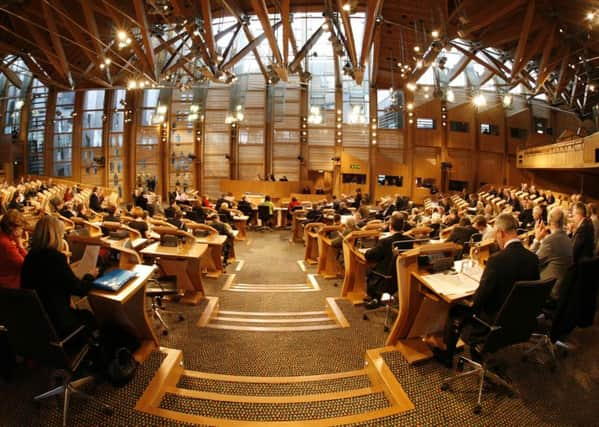SNP defeated in Offensive Behaviour at Football Act vote


Oppositon parties at Holyrood united to narrowly defeat the SNP Government and push through a motion which calls for the Offensive Behaviour at Football and Threatening Communications Act (OBA) to be repealed.
Although tonight’s vote is not binding on ministers, a forthcoming bill from Labour MSP James Kelly which would bring an end to the controversial legislation, now looks certain to be passed in the new year.
Advertisement
Hide AdAdvertisement
Hide AdHe said that the laws are now “dead in the water” and called on ministers to bring forward plans for their repeal as a “matter of urgency.”
The law, which came into force in 2012, criminalised offensive and threatening behaviour, including sectarian behaviour, related to football matches and any communications containing threats or incitement to religious hatred.
Justice Secretary Michael Matheson had appealed to MSPs to stick with the laws, claiming that repeal will leave Scotland trailing behind the rest of the UK in the fight against such abuse.
But the Tories, Labour, Greens and Liberal Democrats at Holyrood combined to defeat the SNP by 64 votes to 63.
The laws have come under fire from fans, clubs and leading legal figures.
Tory MSP Murdo Fraser insisted that there were - and still remain - existing laws in place, such as breach of the Peace, which would cover many of the offences in OBA.
“This is bad law, it has united football fans, commentators, lawyers and the judiciary in opposition - it is unworkable and creates tensions between fans and the police,” he said.
“This is an act that unfairly targets those who are in a football ground, are associated with football, and doesn’t address sectarian behaviour.”
Advertisement
Hide AdAdvertisement
Hide AdThe legislation was pushed through by the majority SNP administration in 2011, without the support of any opposition parties, after a bad tempered Old Firm Game which saw rival managers Ally McCoist and Neil Lennon clash n the touchline.
But a year after its introduction Dundee sheriff Richard Davidson said the laws were “badly drafted” and mince, while the Law Society have been among the groups who say that much of the Act is covered by existing law.
Mr Kelly this week unveiled the findings of 3,600-strong consultation into this Bill which found that 70% os respondents wanted to scrap the legislation.
Nearly half of those being charged under the laws are young men under 20, told MSPs.
“Many of them are being brought into the criminal justice system for the first time - I can’t believe for a minute that that’s a policy outcome that this Government wanted.”
Liberal Democrat Liam McArthur branded the legislation a “headline grabbing stunt” which has proven to be counter-productive.
“This Act was flawed from the start,” he said.
“It was a knee-jerk reaction to reprehensible scenes at an Old Firm game and accusations that the then First Minister and his Government had taken their eye of the ball and failed to carry forward the work on sectarianism previously led by Jack McConnell.”
Mr Matheson told MSPs they were united in their desire to tackle sectarianism and insisted that legislation was not “panacea” in addressing this.
Advertisement
Hide AdAdvertisement
Hide AdHe insisted minister have urged the opposition parties to set out alternative approaches and shortcomings in the legislation but have been met with “silence.”
The minister also warned that repeal would mean scrapping the second part of the Bill which deals with threatening communications, introduced after Lennon was sent bullets through the post, but also used to tackle online abuse.
“Those who want to say this is just about football have to recognise that when they want to repeal this piece of legislation they also want to repeal an aspect of this legislation which is essential in dealing with threatening communications.
“We will be the only part of the UK that does not criminalise threatening communication that has the purpose of stirring up religious hatred.
